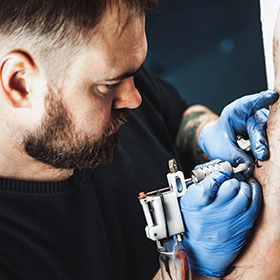Yes, you can swim with a henna tattoo, but there are precautions. Henna tattoos are temporary body art and need care to last longer.
Henna tattoos, also known as mehndi, are popular for their intricate designs and natural beauty. They are made from the henna plant, which stains the skin a deep orange or brown. But, like any temporary body art, their longevity depends on how well you care for them.
If you love swimming, you might worry about your henna tattoo fading too quickly. Chlorine in pools and salt in seawater can affect the tattoo’s lifespan. But with a few simple steps, you can enjoy swimming without ruining your henna. Keep reading to learn how to protect your henna tattoo while swimming.
Introduction To Henna Tattoos
Henna is a natural dye. It comes from a plant called Lawsonia inermis. The leaves are dried and ground into a powder. This powder is mixed with water to form a paste. The paste is applied to the skin. It leaves a reddish-brown stain. This stain can last for one to three weeks.
Henna tattoos have deep roots in many cultures. They are popular in South Asia, the Middle East, and North Africa. Henna is used in festivals, weddings, and other celebrations. It is a sign of joy and beauty. Each design holds special meaning. Flowers, birds, and symbols tell unique stories. Henna connects people to their heritage. It brings communities together.
Henna Tattoo Application
Henna tattoos are made from natural henna paste. The artist uses a cone to draw designs on the skin. The paste should stay on the skin for several hours. This allows the color to seep into the skin. It is important to leave the paste on as long as possible.
The henna paste will dry and crack. This takes about 30 minutes. After drying, the paste needs to set. This can take 4 to 6 hours. Some people leave it on overnight. The longer it stays, the darker the stain. When the paste is removed, the design is bright orange. It will darken over the next few days.
Impact Of Swimming On Henna Tattoos
Henna tattoos can fade when exposed to water. Water makes the skin swell. This can cause the henna to crack. Fresh henna tattoos are more sensitive. They can fade faster in water. Keep henna dry for the first 24 hours. This helps the color set well. Henna needs time to darken. Wetting too early can ruin the design.
Chlorine in pools can fade henna tattoos. Chlorine is a strong chemical. It breaks down henna faster. Saltwater also affects henna. Salt can dry out the skin. Dry skin makes henna fade. Swimming in the ocean can cause this. Always rinse off after swimming. This helps remove chlorine or salt. Moisturize your skin after drying.
Protecting Your Henna Tattoo
Wait at least 24 hours after getting your henna tattoo. This allows the henna to set well. Before swimming, apply a layer of petroleum jelly. This helps to protect the design. Avoid using any oil-based products. They can make the henna fade faster.
Use a waterproof bandage to cover your henna tattoo. This keeps it safe from water. Another option is to wrap the area with plastic wrap. Ensure it is secure and tight. You can also wear a waterproof sleeve. These methods help the henna last longer. Always dry the tattoo area well after swimming.
Aftercare For Henna Tattoos
Swimming with a henna tattoo can cause it to fade quickly. Keep the tattoo dry for at least 24 hours. Chlorine and saltwater can shorten the lifespan of your henna design.
Post-swim Care Tips
Swimming can fade your henna tattoo. To keep it bright, follow these tips. Pat your skin dry instead of rubbing it. Rubbing can remove the henna. Apply a thin layer of coconut oil after swimming. This helps keep the color. Avoid using harsh soaps on the tattoo area. Mild soaps are better. Keep the tattoo moisturized to maintain its color. Too much sun can also fade the henna. Wear sunscreen over the tattoo.
Maintaining Color And Longevity
To make your henna tattoo last longer, keep it dry for the first 12 hours. Water can lighten the color. Do not use lotions with alcohol. Alcohol can fade the henna. Wear loose clothing to avoid friction. Friction can wear off the tattoo. Try to sleep with the tattoo uncovered. This allows it to breathe. Use natural oils like olive oil for moisture. Avoid scrubbing the tattoo area. Scrubbing can remove the henna.
Alternatives To Swimming
Enjoying water does not mean swimming only. Try kayaking or canoeing. These are fun and keep you dry. Paddleboarding is another great choice. Stay on the board and your henna tattoo stays safe. Fishing by the lake or river is relaxing. You can also enjoy boating. Stay above water and still have fun.
There are many activities on dry land. Hiking through nature trails is exciting. Biking around the park is enjoyable. Picnicking with friends or family is a great way to relax. Playing sports like soccer or basketball keeps you active. Reading under a tree can be very calming. Bird watching is interesting and peaceful. Gardening is also a nice activity. Keep your henna safe and still have fun.
Common Misconceptions
Many believe henna tattoos are like permanent ones. This is not true. Henna is temporary. It fades over time. Permanent tattoos do not fade. Henna stains the top layer of skin. Permanent tattoos use ink that goes deeper. They last forever. These differences are important to note.
Some think henna is not safe in water. Henna is generally safe. It does not mix with water. Swimming will not ruin your henna tattoo. Just be gentle with it. Avoid harsh scrubbing. Your henna will last longer. Always check if you have sensitive skin.
Conclusion
Swimming with a henna tattoo is safe with some precautions. Wait until your henna fully dries. Fresh henna may fade in water. Use gentle soap and pat dry after swimming. Avoid chlorine pools when possible. Remember, saltwater can also affect henna.
Caring for your henna tattoo ensures it lasts longer. Enjoy your swim while keeping your henna vibrant. Always prioritize proper aftercare for the best results.

